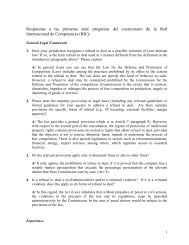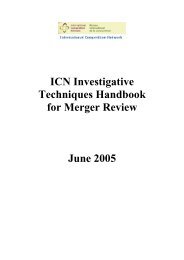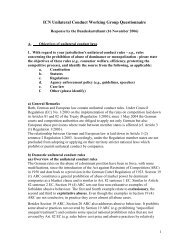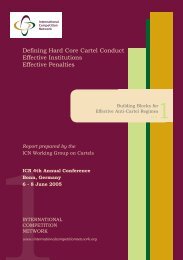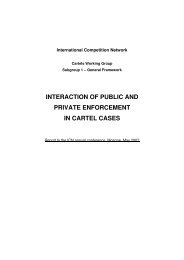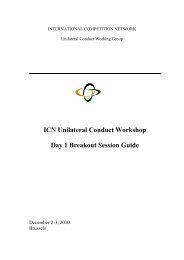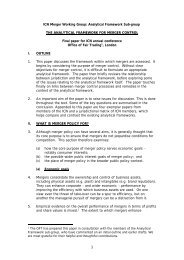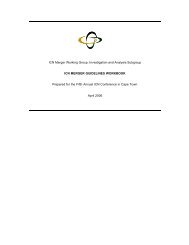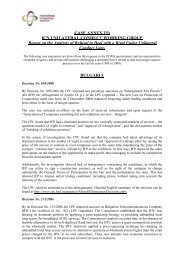Setting of Fines for Cartels in ICN Jurisdictions - International ...
Setting of Fines for Cartels in ICN Jurisdictions - International ...
Setting of Fines for Cartels in ICN Jurisdictions - International ...
You also want an ePaper? Increase the reach of your titles
YUMPU automatically turns print PDFs into web optimized ePapers that Google loves.
3. ADDRESSEES OF SANCTIONS AND TRANSPARENCY<br />
3. ADDRESSEES OF SANCTIONS AND TRANSPARENCY 11<br />
This chapter covers two further issues <strong>of</strong> relevance be<strong>for</strong>e enter<strong>in</strong>g <strong>in</strong>to the details <strong>of</strong> the process and methodology<br />
<strong>of</strong> determ<strong>in</strong><strong>in</strong>g the f<strong>in</strong>e, namely, the entity on which the f<strong>in</strong>e is imposed (the addressee <strong>of</strong> the f<strong>in</strong>e), and<br />
the issue <strong>of</strong> transparency, that is, how much <strong>in</strong><strong>for</strong>mation is made available publicly by an agency about how its<br />
f<strong>in</strong>es are determ<strong>in</strong>ed <strong>in</strong> general, and how they have been determ<strong>in</strong>ed <strong>in</strong> specific cases.<br />
3.1 Addressees <strong>of</strong> sanctions<br />
The divergence <strong>in</strong> nature and k<strong>in</strong>d <strong>of</strong> sanctions imposed <strong>for</strong> cartel <strong>in</strong>fr<strong>in</strong>gements by different jurisdictions can<br />
partly be expla<strong>in</strong>ed by the nature <strong>of</strong> the en<strong>for</strong>cement system, be it crim<strong>in</strong>al or adm<strong>in</strong>istrative. However, with<strong>in</strong><br />
the same type <strong>of</strong> system, differences can also be observed as to various addressees upon which the coercive<br />
measures may be imposed. The approach generally adopted <strong>in</strong> all systems covered <strong>in</strong> this report is to impose<br />
sanctions, ma<strong>in</strong>ly f<strong>in</strong>es, on specific undertak<strong>in</strong>gs engaged <strong>in</strong> unlawful agreements, <strong>in</strong> other words, the undertak<strong>in</strong>gs<br />
directly participat<strong>in</strong>g <strong>in</strong> the cartel meet<strong>in</strong>gs or contacts. Competition rules <strong>of</strong> most countries provide<br />
competition agencies or courts with the possibility to impose f<strong>in</strong>es or other pecuniary sanctions on undertak<strong>in</strong>gs<br />
found to have participated <strong>in</strong> cartels.<br />
However, the term “undertak<strong>in</strong>g” can be <strong>in</strong>terpreted <strong>in</strong> a different, sometimes quite extensive way. In the EU<br />
<strong>for</strong> example, an undertak<strong>in</strong>g can <strong>in</strong>clude several different legal entities which by virtue <strong>of</strong> their structural and<br />
contractual l<strong>in</strong>ks operate as a s<strong>in</strong>gle economic unit <strong>in</strong> a specific market. The corollary <strong>of</strong> this def<strong>in</strong>ition is<br />
that when attribut<strong>in</strong>g liability <strong>for</strong> an <strong>in</strong>fr<strong>in</strong>gement <strong>in</strong> a cartel case several legal entities belong<strong>in</strong>g to the same<br />
undertak<strong>in</strong>g may be held liable <strong>for</strong> the <strong>in</strong>fr<strong>in</strong>gement. For example <strong>in</strong> the case <strong>of</strong> a group, a parent company can<br />
be held liable <strong>for</strong> the conduct <strong>of</strong> one <strong>of</strong> its subsidiaries, when the parent determ<strong>in</strong>ed the commercial policy<br />
pursued by this subsidiary i.e. when this subsidiary did not <strong>in</strong>dependently determ<strong>in</strong>e its conduct <strong>in</strong> the market.<br />
The described approach has been adopted by the Czech Republic, European Commission, Hungary, Italy, Korea,<br />
Netherland, New Zealand, Serbia, Switzerland and Turkey.<br />
The first consequence <strong>of</strong> such an approach, <strong>for</strong> the European Commission, is that part <strong>of</strong> the <strong>in</strong>vestigation has<br />
to focus on a detailed reconstruction <strong>of</strong> the structure <strong>of</strong> the group <strong>for</strong> the period <strong>in</strong> which the cartel existed.<br />
Under Community law, a company hold<strong>in</strong>g 100% (or very close to 100%) <strong>of</strong> the shares <strong>of</strong> another company, is<br />
presumed to be responsible <strong>for</strong> the conduct <strong>in</strong> the market <strong>of</strong> its subsidiary. The <strong>for</strong>mer is presumed to be <strong>in</strong><br />
control <strong>of</strong> the latter (accord<strong>in</strong>g to case law: to be able to exercise or to have exercised decisive <strong>in</strong>fluence over<br />
the subsidiary’s commercial policy). Such presumption can be rebutted and it is <strong>for</strong> the companies to provide<br />
evidence support<strong>in</strong>g a rebuttal. After the identification <strong>of</strong> the companies belong<strong>in</strong>g to the undertak<strong>in</strong>g at the<br />
time <strong>of</strong> the activity <strong>of</strong> the cartel, the Commission may also have to determ<strong>in</strong>e who their legal or economic<br />
successors are.<br />
The second consequence <strong>of</strong> such an <strong>in</strong>terpretation <strong>of</strong> the concept <strong>of</strong> undertak<strong>in</strong>g is that any maximum statutory<br />
limits <strong>for</strong> f<strong>in</strong>es apply to the undertak<strong>in</strong>g as a whole and not to the <strong>in</strong>dividual companies. As regards the<br />
EU, the f<strong>in</strong>e imposed (be<strong>for</strong>e apply<strong>in</strong>g leniency) cannot exceed 10% <strong>of</strong> an undertak<strong>in</strong>g’s turnover, <strong>in</strong> this case<br />
there<strong>for</strong>e mean<strong>in</strong>g the turnover <strong>of</strong> the undertak<strong>in</strong>g as a whole. This prevents the possibility <strong>for</strong> certa<strong>in</strong> large<br />
groups to participate <strong>in</strong> cartels via one <strong>of</strong> their very small subsidiaries, with the idea that the maximum statutory<br />
limit <strong>of</strong> the f<strong>in</strong>e would be applied to the size <strong>of</strong> the small subsidiary <strong>in</strong> question.<br />
However, <strong>in</strong> several jurisdictions, agencies or courts can also f<strong>in</strong>e natural persons, i.e. the specific <strong>in</strong>dividual<br />
who committed the <strong>in</strong>fr<strong>in</strong>gement <strong>in</strong> addition to f<strong>in</strong><strong>in</strong>g the undertak<strong>in</strong>g. The logic beh<strong>in</strong>d these systems is that<br />
the imposition <strong>of</strong> sanctions only on the undertak<strong>in</strong>g cannot ensure adequate deterrence. Undertak<strong>in</strong>gs are<br />
engaged <strong>in</strong> cartels through the conduct <strong>of</strong> their representatives who are natural persons. Sanctions imposed<br />
on <strong>in</strong>dividuals can there<strong>for</strong>e complement f<strong>in</strong>es imposed on corporations/undertak<strong>in</strong>gs and enhance deterrence.<br />
For this reason, several countries provide their responsible authorities with the possibility to impose<br />
f<strong>in</strong>es on natural persons <strong>in</strong>volved <strong>in</strong> cartel conduct. This approach has been adopted <strong>in</strong> Brazil, Canada, Ireland<br />
(f<strong>in</strong>e <strong>for</strong> procedural breaches can be imposed only on <strong>in</strong>dividuals), Japan, Jordan, Korea, Mexico, Netherlands,<br />
New Zealand, Serbia, Turkey, US and France (where such f<strong>in</strong>e can be imposed by courts). In Switzerland, a<br />
pecuniary sanction may be imposed on specific <strong>in</strong>dividuals if they <strong>in</strong>tentionally violate an amicable settle-<br />
<strong>ICN</strong> — SETTING OF FINES FOR CARTELS IN <strong>ICN</strong> JURISDICTIONS



